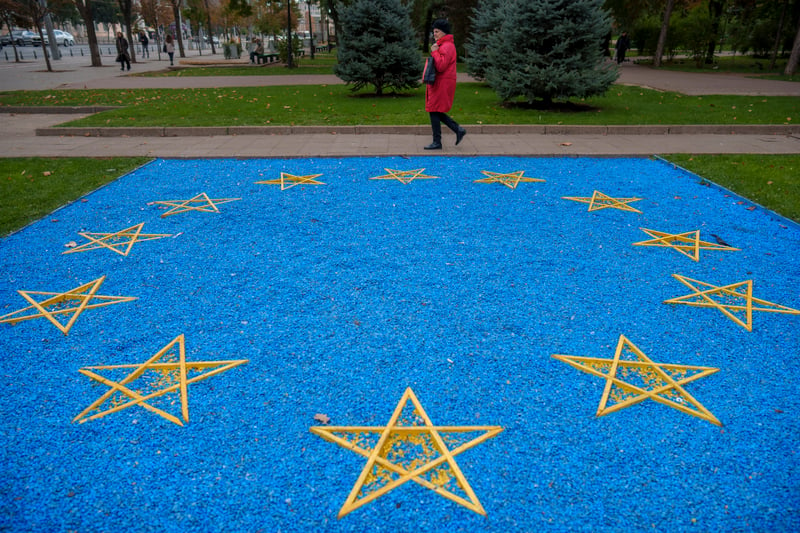(CN) — Moldova’s movement toward joining the European Union was thrown into doubt after the country’s strongly pro-EU president, Maia Sandu, won lukewarm support on Sunday in her bid for reelection and to enshrine EU membership into the constitution.
The election results meanwhile were being contested with both sides questioning their validity. Sandu accused pro-Russian forces of a wide-scale vote-buying scheme while the Kremlin and Sandu’s opponents questioned a late shift in the count that saw the referendum swing in favor of the pro-EU side.
Sunday’s elections were billed as a crucial moment for the small and impoverished former Soviet republic caught in a tug-of-war between the West and Russia.
Since 1991, Moldova has been partitioned with Russian troops occupying a pro-Russian eastern slice of the country known as Transnistria. Since the outbreak of war in Ukraine, Sandu has backed Kyiv and championed turning Moldova definitively toward the West. In December, Brussels began the lengthy process of bringing Moldova into the bloc.
On Sunday, voters cast ballots in both a first round of presidential elections and in a referendum about whether EU membership should be included as a national aspiration in the constitution. Previously, Ukraine and Georgia added similar pro-EU language in their constitutions as a method to prevent a shift away from the EU. Such moves have angered Moscow and at times sharpened splits in domestic opinion.
Polls ahead of the referendum suggested support for EU membership was at about 60%, but by Monday the pro-EU camp squeaked by with only 50.4% of the vote. A slew of “yes” votes from Moldovans living outside the country in the EU, the United States and elsewhere gave the pro-EU side the win. About 1.5 million ballots were cast with turnout at just over 50%.
The slim pro-EU margin was hardly a resounding victory for Sandu, who pushed to include the EU referendum in Sunday’s vote. Court challenges and protests were expected.
In the presidential race, the center-right liberal Sandu, a 52-year-old Harvard-educated leader of the Party of Action and Solidarity, also did not pick up as much support as she hoped and was forced into a Nov. 3 runoff against Alexandr Stoianoglo, a pro-Russian former prosecutor. Sandu picked up about 42% of the vote while Stoianoglo got about 26%. He is backed by Moldova’s Party of Socialists.
In the second round, Stoianoglo was in a good position to pick up many votes cast for two other contenders in the race, both seen as pro-Russian politicians.
At around 2 a.m. Monday, as ballots were being tallied with the pro-EU vote behind in the count, Sandu held a news conference in which she accused “foreign forces” and “criminal groups” of perpetrating an “unprecedented assault on our country’s freedom and democracy.”
“We have clear evidence that these criminal groups aimed to buy 300,000 votes — a fraud of unprecedented scale,” Sandu said. “Their objective was to undermine a democratic process.”

Earlier this month, Moldovan police accused pro-Russian forces of orchestrating a large-scale vote-buying scheme. The country’s police chief, Viorel Cernauteanu, said $15 million was transferred from Russia to Moldova citizens to buy the votes of more than 100,000 people.
After securing the referendum win later Monday, Sandu said, “Moldova has won the first difficult battle in the push to join the European Union.”
Ion Marandici, a political scientist who studies Moldova, said the elections were pivotal because the country’s “EU integration” was “on the ballot.”
After years of seeking entry into the EU, Moldova has moved much closer to becoming a member under Sandu’s leadership and the “new geopolitical environment following Russia’s invasion of Ukraine,” Marandici said in an email.
However, the close referendum result showed many voters in Moldova are uneasy with EU membership, a sentiment underestimated by polls, he added.
“There was more Euroskepticism than anticipated,” he said. “Over the last two decades, surveys have consistently shown strong support for the EU option. Yesterday, that consensus was shattered.”
However, he said some “no” votes in the referendum could be linked to the vote-buying scheme and that many people likely used the ballot to express their dissatisfaction with Sandu’s government.
He said Sandu will face a tough runoff and that Moldova’s EU aspirations would suffer if she loses.
“It will be a tight race,” Marandici said.
He doubted Sandu would try to win over those who voted for the third-place finisher, Renato Usatii, because he was “a populist politician with authoritarian inclinations.”
“Should one of Sandu’s opponents accede to power, relations with the EU would probably deteriorate,” he said.
He said Moscow clearly meddled in the elections because it wanted to steer Moldova away from the EU. The Kremlin is eager to see Sandu defeated because of her strong support for Ukraine, he added. Stoianoglo, he said, would likely “restore relations with Russia” if he wins the runoff.
Courthouse News reporter Cain Burdeau is based in the European Union.




















